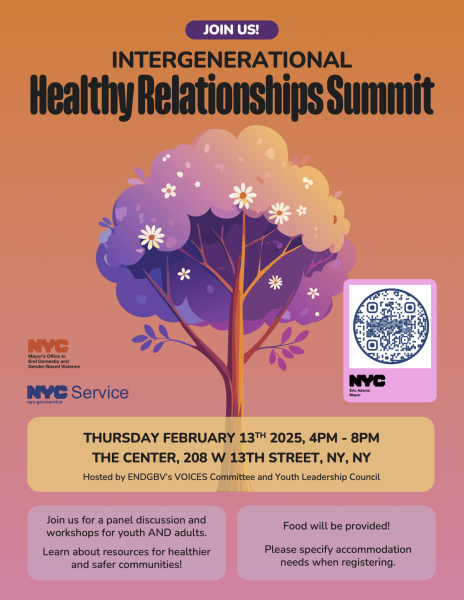
Earlier this month, Saloni Sethi, Commissioner of the NYC Mayor’s Office to End Domestic and Gender-Based Violence, reached out to The Classic to share her thoughts on the importance of healthy teen relationships. As February is Teen Dating Violence Awareness Month, Commissioner Sethi and her office will be hosting the Intergenerational Healthy Relationships Summit on Thursday, February 13. Read the commissioner’s guest essay below to learn about the event.
Dear Townsend Harris High School Students,

As a child, I remember nights lying in bed and hearing my parents fighting. I wondered why they treated each other that way, and promised myself that when I grew up, I would do things differently—I wouldn’t tear down those I cared about.
Yet, that’s not quite how things turned out. As a teenager and young adult, my early dating relationships were all marked by high levels of conflict. I felt like there was no other way to address my feelings of insecurity, jealousy, and fear of abandonment. During one particularly difficult break up, a former partner said to me, “you can’t prove that I’ll always be there by trying to put me through everything.” And that’s something that still sticks with me 25 years later as I continue trying to balance my own needs and desires with my partner’s—even as I’m now the Commissioner of the NYC Mayor’s Office to End Domestic and Gender-Based Violence.
The truth is that the road to a healthy relationship can be a difficult one—you will navigate accidents, potholes, and forks along the way. And like any bumpy road, relationships require constant work. You’re not expected to know all the answers—relationships aren’t a test you can study for. Give yourself the grace to make mistakes. The real insight comes after the slip-up—what did you learn and how will you move forward?
A false premise often surrounds love—that it’s supposed to hurt. But it’s not. Passion doesn’t require tension or fighting. Sometimes we don’t realize this because we haven’t witnessed healthy communication in action.
Healthy relationships are built on establishing clear boundaries and recognizing when those boundaries are not being respected. One strategy is to check in with yourself to make sure your actions aren’t having a negative or unintended impact. If they are, ask yourself how you can make a change.
Relationships should also be rooted in mutual respect. You are worthy of being liked for your authentic self—not for who others want you to be. That personal autonomy is critical when it comes to consent. Can you have that ongoing conversation with your partner? If you fear their reaction when you say “no,” that’s a red flag.
The fundamentals of healthy relationships don’t just apply to romantic relationships. You can practice them in friendships and with your family. One challenge you may encounter is that many of your parents and caregivers also haven’t had conversations about healthy relationships.
New York City is trying to bridge that gap with our Intergenerational Healthy Relationships Summit on Thursday, February 13 between 4:00 p.m. and 8:00 p.m. A resource fair, panel discussions, and workshops on consent and communication will help you build bridges to healthier connections. People under the age of 18 attending without a chaperone should have a consent form signed by a legal parent or guardian.
If you or somebody you know is in an unhealthy relationship, New York City has several free resources available to help you. You can call NYC’s 24-Hour Hope Hotline at 1 (800)-621-HOPE (4673). You can also chat with an advocate from Monday through Friday 10:00 a.m. to 8:00 p.m.; Saturday 10:00 a.m. to 3:00 p.m.; and Sunday 9:00 a.m. to 5:00 p.m.
You have the power to learn the skills to create and maintain healthy relationships that are a positive force for good in your life—and New York City is here to support you every step of the way.
Best,
Saloni Sethi
Commissioner
NYC Mayor’s Office to End Domestic and Gender-Based Violence


























